There is no doubt that things are changing in healthcare sales and marketing, and many in the industry are in dire need of an adaptive sales enablement approach that can optimize costs, enhance multi-channel capability, and enable an inbound digital sales and marketing strategy.
So, what is adaptive sales enablement, and why do healthcare industry sales reps need adaptive discussions? Today’s article explores these questions and provides an answer to many sales and marketing challenges in the healthcare industry.

What is Adaptive Sales Enablement?
It helps to begin by taking a look at adaptive discussions.
Adaptive discussions are interactions where pharma sales reps (PSRs) can quickly and effortlessly switch persona targets in a sales presentation or throughout the sales process. The target persona could be a patient, healthcare provider (HCP), payer, government regulator, family of the patient, etc.
Each of these targets has a decision journey, sometimes called the CareFlow, and their needs, concerns, and objectives shift as they move through this journey.
An adaptive PSR has the capacity to switch between personas with the appropriate communications for each target.
For this to be possible, the healthcare sales and marketing team needs end-to-end automation and an adaptive sales enablement solution.
What is Sales Enablement?
In essence, sales enablement facilitates three core functions:
- Digital sales and marketing content management;
- Multi-channel reach with no device or connection limitations; and
- Sales analytics with behavioural metrics.

To learn more, follow this link to our article ‘What Is Sales Enablement’, or you can check out our new infographic that breaks down the functions of sales enablement.
Why do Healthcare Sales and Marketing Teams need Adaptive Sales Enablement?
Several trends influence the need for an adaptive sales enablement solution, and they include internal and external pressures. Some industries are ahead of others with respect to their need for sales enablement – such as technology, wealth management, life science, etc.
However, needs aren’t industry-specific, industries are simply a benchmark for adoption rates. Some industries and companies have more unique sales enablement needs than others. For a detailed look at the general trends impacting the need for sales enablement across all industries, download a FREE copy Chapter 1 from our Sales Enablement Success series.
Let’s examine some of the challenges motivating the need for pharma sales enablement software.
Internal Challenges
1. Growing Digital Sales and Marketing Content Libraries
As more interactions become digital, and organizations adopt a digital sales process, the library of available digital content grows. This is the most common trigger for companies to invest in content management software. Marketing teams have marketing automation programs, but many sales reps tend to use unorthodox approaches like email attachments, cloud drives, and personal hard drives for content management.
Without an appropriate content manager, sales reps stop using digital sales content entirely, and sometimes create their own material. For pharma, this behaviour is unacceptable as it risks violating compliance regulations.
With respect to healthcare, the boom of speciality medicines is adding more friction to the sales process, as these treatments are tougher to communicate and sell.

2. Out of Control Sales and Marketing Costs
The pharma sales approach of the 1990’s has succumbed to contemporary challenges and trends. Massive sales forces and in-person detailing are among the least preferred methods of communication by HCPs, no longer justifying the industry average sales and marketing expenditure of 27.5% of sales! (Source: Accenture, 2012).
As specialty medicines push up research and development costs (averaged at 16% of sales), the current cost distribution becomes more unacceptable for efficient operations, and an automated approach is required.
Adaptive sales enablement uses end-to-end automation with an inbound content marketing approach to cut down on direct in-person interactions and free up PSRs for other engagements. 3rd party vendors offer the best alternative for building a cost-effective and automated healthcare sales and marketing value chain.
3. The Need for Data Across the Sales Cycle
92% of healthcare industry executives have stated that they will be outsourcing analytics to third party service providers, and 87% plan on increasing the use of analytics across the value chain to drive stronger ROI (Source: Accenture, 2013).
Ideally, predictive analytics are used to combine data from across the organization, and to track target engagement from lead capture straight through to close.
CRM databases suffer from hindsight insights rather than targeted predictive analysis. Marketers are realizing the inherent value in digital content-based communications, and monitoring this data across the value chain to offer unique opportunities for every facet of planning and strategizing.
4. Geographic Differences
As local needs continue to diversify across customer segments, regulatory requirements, and engagement preferences, having a single global communications strategy will limit reach and use.

This means healthcare companies need to create content and communications that meet local needs, and add value in unique ways for each target persona. A global asset management platform like pharma sales enablement allows centralized marketing teams to control a global brand and account for geographic variance while sustaining branding and communications quality. As local preferences continue to become more diverse, coordinated communications will become invaluable.
5. Evolving Regulations
Similarly to geographical preferences and needs, regulatory compliance is always evolving. Regulatory needs complicate the sales process by introducing another element for PSRs to monitor.
An intuitive solution is to place sellers in the field for each governing region, creating regulatory specialists around the world. However, with spiralling costs and the need for inbound marketing approaches, the healthcare industry must have a more rigid set-and-forget solution that works worldwide.
Global asset management with pharma sales enablement empowers a central team to monitor regulatory compliance, creating more time for field reps to focus on engaging HCPs and building relationships.
External Challenges
1. Less Time with HCPs
Since 2008, time with HCPs has been steadily declining. There are many reasons for this: more patients, increasingly complex healthcare challenges, budget cuts, and HCP consolidation – leading to institutional purchasing policies and less autonomy.
But in reality, the biggest decline is likely due to the declining value of PSRs.

If your target HCP feels that the in-person approach provides no value, you can bet that they won’t make time for your visit.
2. Multiple Actors in any Sales Process
The 90’s are over, and it isn’t enough to treat a HCP to dinner and earn commitment for a healthcare solution. Depending on the sale, you may be required to include the patient, members of the patient’s family, payers/insurers, and even government decision makers. Each of these individuals is an entirely different persona for that sales process, and these needs can shift as the process moves down the funnel.
The PSR is still one person, and they are focused on establishing a trust-based relationship built on credibility with their targets. Healthcare industry sales have evolved more over the last 20 years than any other industry and this isn’t going to stop any time soon (Source: MedCepts, 2015).
Equipping PSRs with the right engagement tools means giving them the capacity to engage the healthcare industry with desired communications in the future.
3. Evolving Needs of HCPs
HCPs are largely acclimatized to the heavy promotional efforts from the pharma industry, and as a result, 75% of HCPs have stated that they do not trust the information provided to them by pharma (Source: Deloitte, 2015). This situation creates a new set of expectations for those working in pharma, making meaningful connections with HCPs will now require PSRs to meet those needs.
This involves end-to-end evidence, and authenticity.
Fewer than one in four HCPs will use a pharma company website for information, and when this is combined with the declining in-person visit preference and rising distrust, the cards are stacked against a PSR looking to develop an honest relationship.

PSRs become instant support assets for HCPs with the aid of an always-ready multi-channel orientation.
HCPs will reach out to PSRs periodically, and adding value with each interaction helps PSRs to slowly develop a trust-based relationship and open communication flow.
4. Changing Needs of Patients
In the past patients accepted the advice of HCPs for all of their healthcare needs, but a sharp rise in online medical advice means that many patients are now looking online for medical advice. Patient expectations are evolving and most expect the healthcare industry to play a larger role in patient success.
According to Accenture, 76% of patients believe that pharma companies are responsible for providing info and services that complement their products, and the majority desire this kind of outreach and connection as they start taking medication.
Many patients desire automated measuring and tracking for adherence support, online forums for self-learning, and access to info about clinical trials, but only a minority of patients receive this level of care.

(Source: Accenture, 2014)
5. Outcome Based Operations
The CareFlow and Outcome Based Solutions are changing how the industry communicates value to patients and HCPs. Healthcare companies need a keen focus on how their solutions and communications address the mix of personas across the CareFlow journey, meanwhile HCPs are more interested in solutions that work – outcomes – rather than the features and benefits of a product.
This trend is similar to what is being seen outside of healthcare, where buyers want tailored long-term solutions that meet their specific needs.
A pharma sales enablement solution allows sellers, both in the field and in the call-center, to provide tailored communications that reflect the specific needs pre-identified before the call, and discovered during the call. Adaptive real-time interactions make every interaction feel authentic while adding value.
These challenges aren’t going away any time soon, and that’s why GSK came to us for their pharma sales enablement solution. Download the case-study below to learn how we helped GSK become “much more responsive” across their sales and marketing operations, while enabling them to “tailor content to individual customers, rather than going in with generic stories and presentations.”
The future of healthcare industry sales means becoming leaner, smarter, faster, digitally enabled, and adaptive in real time. In our next article we’ll explore exactly how a PSRs can become adaptive to the needs of HCPs.
If you’re interested in taking our Pharma Sales Enablement solution out for a test drive, request a demo below and let us show you why our clients stopped worrying about these trends a long time ago.













